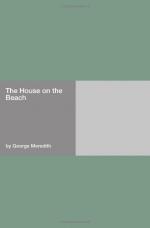“That is because you have had a disappointment. I know you, papa,” said Annette.
“Yes, it’s rather a damper about old Mart Tinman,” her father assented. “Or else I have n’t recovered the shock of smashing that glass, and visit it on him. But, upon my honour, he’s my only friend in England, I have n’t a single relative that I know of, and to come and find your only friend making a donkey of himself, is enough to make a man think of eating and drinking.”
Annette murmured reproachfully: “We can hardly say he is our only friend in England, papa, can we?”
“Do you mean that young fellow? You’ll take my appetite away if you talk of him. He’s a stranger. I don’t believe he’s worth a penny. He owns he’s what he calls a journalist.”
These latter remarks were hurriedly exchanged at the threshold of Crickledon’s house.
“It don’t look promising,” said Mr. Smith.
“I didn’t recommend it,” said Crickledon.
“Why the deuce do you let your lodgings, then?”
“People who have come once come again.”
“Oh! I am in England,” Annette sighed joyfully, feeling at home in some trait she had detected in Crickledon.
CHAPTER III
The story of the shattered chiwal-glass and the visit of Tinman’s old schoolmate fresh from Australia, was at many a breakfast-table before. Tinman heard a word of it, and when he did he had no time to spare for such incidents, for he was reading to his widowed sister Martha, in an impressive tone, at a tolerably high pitch of the voice, and with a suppressed excitement that shook away all things external from his mind as violently as it agitated his body. Not the waves without but the engine within it is which gives the shock and tremor to the crazy steamer, forcing it to cut through the waves and scatter them to spray; and so did Martin Tinman make light of the external attack of the card of Van Diemen Smith, and its pencilled line: “An old chum of yours, eh, matey? “Even the communication of Phippun & Co. concerning the chiwal-glass, failed to divert him from his particular task. It was indeed a public duty; and the chiwal-glass, though pertaining to it, was a private business. He that has broken the glass, let that man pay for it, he pronounced—no doubt in simpler fashion, being at his ease in his home, but with the serenity of one uplifted. As to the name Van Diemen Smith, he knew it not, and so he said to himself while accurately recollecting the identity of the old chum who alone of men would have thought of writing eh, matey?
Mr. Van Diemen Smith did not present the card in person. “At Crickledon’s,” he wrote, apparently expecting the bailiff of the town to rush over to him before knowing who he was.
Tinman was far too busy. Anybody can read plain penmanship or print, but ask anybody not a Cabinet Minister or a Lord-in-Waiting to read out loud and clear in a Palace, before a Throne. Oh! the nature of reading is distorted in a trice, and as Tinman said to his worthy sister: “I can do it, but I must lose no time in preparing myself.” Again, at a reperusal, he informed her: “I must habituate myself.” For this purpose he had put on the suit overnight.




